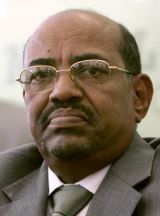Sudan wants limited UN role in Darfur
March 13, 2007 (UNITED NATIONS) — Sudan’s president has detailed his objections to a U.N. plan to support African Union troops in Darfur, saying in a document obtained Monday he wants fewer U.N. forces in the country and no helicopters or reconnaissance aircraft.
 President Omar al-Bashir said in a letter to Secretary-General Ban Ki-moon circulated Friday that he did not agree to a proposal to send more than 3,000 U.N. military, police and other personnel, along with substantial aviation and logistical assets, to beef up the 7,000-strong AU force trying to maintain security in the vast desert region.
President Omar al-Bashir said in a letter to Secretary-General Ban Ki-moon circulated Friday that he did not agree to a proposal to send more than 3,000 U.N. military, police and other personnel, along with substantial aviation and logistical assets, to beef up the 7,000-strong AU force trying to maintain security in the vast desert region.
The annex to the letter obtained Monday by The Associated Press details the government’s insistence on maintaining control over the deployment of all international troops and police and on keeping the U.N. in a subordinate role to the AU.
The letter and annex focus on the U.N.’s proposed “heavy support” package, the second phase of a three-stage plan that is supposed to culminate in a 22,000-strong joint U.N.-AU peacekeeping mission. The first stage of the plan — a “light support” package adding some equipment, military officers and U.N. police to the AU operation — is nearly complete.
Sudan agreed to the three-stage plan at a meeting in November and it was endorsed by the AU’s Peace and Security Council, but in January, al-Bashir said the U.N. troops were not needed because the AU force on the ground could handle the job.
Darfur’s conflict erupted in 2003 when ethnic African rebels took up arms against the Arab-dominated central government, accusing it of neglect. The government is accused of unleashing militias known as the janjaweed, which are blamed for the bulk of the conflict’s atrocities.
More than 200,000 people have died and 2.5 million have fled their homes in four years of conflict.
Britain’s U.N. Ambassador Emyr Jones Parry said Monday the letter is “very disappointing.”
“It’s a major setback, and is tantamount to a requirement for a renegotiation of some of the points in the heavy support package,” he said.
U.N. spokeswoman Michele Montas said the secretary-general did not consider the letter a setback and wants to discuss it with the Security Council on Thursday before commenting.
“There are positive elements … and the secretary-general would like to see, from these positive elements, how far we can go,” Montas said.
Al-Bashir said in the annex that the proposed heavy support package revealed “essential differences in the understanding of the nature and objectives of United Nations support for the African Union” which should be resolved by U.N., AU and Sudanese government officials.
In last week’s letter to Ban, al-Bashir made scant reference to the November agreements, arguing instead that the U.N. plan “contravenes” the Darfur Peace Agreement signed in May 2006 between Sudan’s government and one of Darfur’s rebel factions.
The annex includes long quotations from the peace accord, which al-Bashir cited along with national laws to raise objections to the U.N.’s proposed deployment of humanitarian liaison, gender and protection officers.
On the military side, al-Bashir objected to deploying U.N. transport and cargo helicopters and said a proposed air reconnaissance unit went against the peace agreement. He said attack helicopters could be used to protect AU and U.N. forces — but not civilians.
As for troops, he agreed to a 200-member field hospital, a 50-member signal company, a 300-member logistics unit, and a 200-member heavy transport company. But he objected to deploying three engineering companies with 900 troops, aviation units with more than 500 troops and two signal companies.
He said all troops deployed as part of the heavy support package should be under AU command and of lower rank than its commanders.
Al-Bashir was adamant that the Sudanese government and police determine the location of all police stations and proposed that U.N. international police be confined to camps for displaced Sudanese and demilitarized and buffer zones to be set up under the peace agreement.
Al-Bashir reiterated his objection to making U.N. financing of the operation “contingent upon the essential involvement of the United Nations in command and control.”
(AP)
